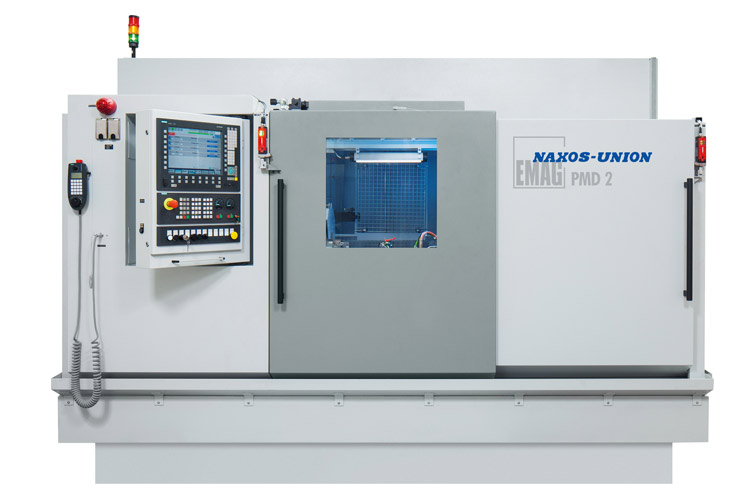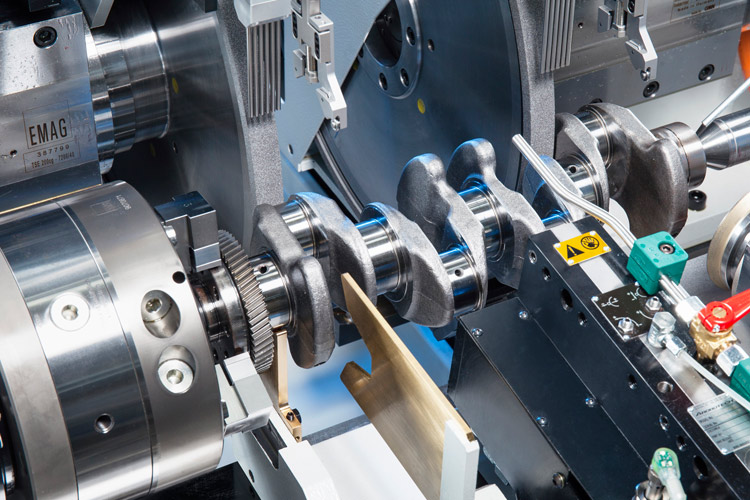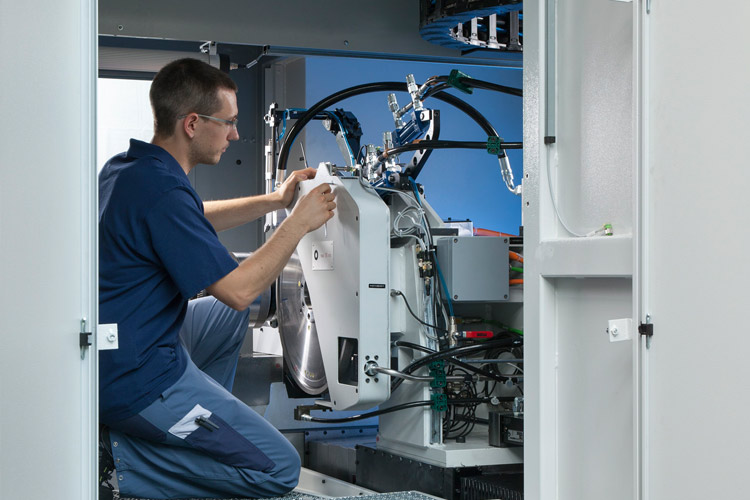The German machine tool giant EMAG is all set to showcase its revolutionary PMD 2 Grinding Machine at the upcoming exhibition AMB 2014. EMAG will present the PMD 2 for the first time at the international metalworking exhibition, the AMB, in Stuttgart. This machine from EMAG NAXOS-UNION provides for high output rates and impresses with its excellent price-performance ratio. The premier exhibition will be held from 16 – 20, September, 2014 in one of the biggest industrial hub Stuttgart.
International competition in the automotive industry is increasing apace. According to the latest studies so are the technological demands on vehicles – and with them the costs. But increasing prices in the face of stiff competition in the market is no longer easily defensible. In production terms, the costs incurred in the manufacture of passenger cars need to be reduced by three to four percent per year to retain current profitability levels – according to a McKinsey study. And this is a staggering percentage. But what does it mean when it comes to manufacturing technologies? The example of the crankshaft clarifies the point. Here, a lot depends on the grinding process carried out on this core engine component. In future, the process needs to be of greater precision and subject to an even higher degree of efficiency. The grinding experts at EMAG offer an interesting alternative in their PMD 2 Crankshaft Grinder.

Actually, the prospects for the automotive industry internationally are very good. The next few years are expected to see noticeable growth (especially in the Asian growth markets). But it is also true that the competition is, in many respects, becoming more complex. In Asia, for instance, new competitors are crowding onto the market. In addition to that, more rigorous national emission limits and safety requirements are leading to an increase in production costs. As a consequence, the eye of the planner is on the manufacturing technology. How can the cost increases be reversed? Crankshaft machining is again a good example. The efficiency and stability of the engine depends on this core component. The grinding process therefore includes a (work-intensive) fine-machining operation in the micrometre range. And this has always been a job for the expert – also where the manufacturer of the relevant technology is concerned.
New capital investment
The machine builders at EMAG have, for decades, relied on a high degree of knowhow in this sector. Among other machine tools, the company – with headquarters in Salach, near Göppingen, Germany – also develops tailor-made grinding solutions for shaft-type components. The new machine PMD 2 complements their crankshaft grinder program. It is designed for the machining of crankshafts for passenger cars and features twin grinding heads that allow for the simultaneous grinding of two pin or main bearings in a single setup, using two grinding wheels. Its capacity covers small components of up to 500 mm length. “With this machine we are rounding off our range of crankshaft grinders to include the machining of smaller components,“ explains Dr Guido Hegener, Managing Director of EMAG Maschinenfabrik GmbH. “Up to now, our range of machines did not include a horizontal twin-head grinder for smaller crankshafts. This gap is now filled with the PMD 2, a machine the excellent price-performance ratio of which is also ideally suited to combat the increasing competition in the automotive industry.“
Outstanding precision guaranteed
The developers at EMAG have been able to fall back on tried and tested technologies. The basis for the PMD 2 is the well proven „Series 2“ of EMAG NAXOS-UNION and EMAG KOPP. These machines combine high-tech grinding technology with precision, great efficiency, process integrity and simple operation. That applies to the PMD 2 as well, of course, where two CBN grinding wheels machine crankshafts to the highest precision. To achieve this, the machine is equipped with a direct-driven workspindle, hydrostatic guideways and a linear motor in the X-axis, as well as an in-process measuring control that allows for roundness monitoring and correction in the machine. “The operator enters the relevant command in the control and the measuring process is carried out once the bearing has been ground. The software, developed by EMAG, then calculates the relevant correction values from the remaining roundness errors. This allows for the subsequent manufacturing processes to be successively optimised“, adds Mr Hegener.
Shorter cycle times – increased productivity levels
The technology also scores with its simultaneous use of two grinding wheels. The twin-tool process opens up a number of possibilities for the user, depending, of course, on component and machining requirements. Two pin bearings or main and pin bearing are machined simultaneously, leading to a reduction in cycle times. For instance, a four-cylinder crankshaft is machined in less than two minutes. The grinding wheels can, if required, be arranged very close together, so that adjoining pin and main bearings can be machined simultaneously. Both, grinding spindles and work headstock are direct-driven. This further increases precision and productivity levels. “We have strung together a technologically very interesting package“, concludes Herr Hegener.
Flexible Configuration
The machine is also of compact but flexible construction. The enclosure includes, for instance, the electrical cabinet. Connecting up an automatic loading system is also no problem. And both, emulsion and oil can be used as coolants. “Flexibility was for us of great importance in using this technology“, confirms Herr Hegener. “We tailor the machine exactly to the customer’s requirements. Integration of the machine into an existing, complex production line is an important option. But we can also see the machine being used as a stand-alone solution, with manual loading“.
EMAG will present the PMD 2 for the first time at the international metalworking exhibition, the AMB, in Stuttgart. The international character of this trade show perfectly suits the strategy of the machine builder from Salach, as the machine can be used in a multitude of markets and production environments. “We are expecting great things from this flexible, efficient approach,“ explains Herr Hegener in conclusion. “The PMD 2 will give both Asian and European users a competitive edge. Component quality and production costs are gaining in importance everywhere. We are looking forward to showing our visitors at the AMB the quality of this technology.“
For more details contact EMAG Holding Gmbh



